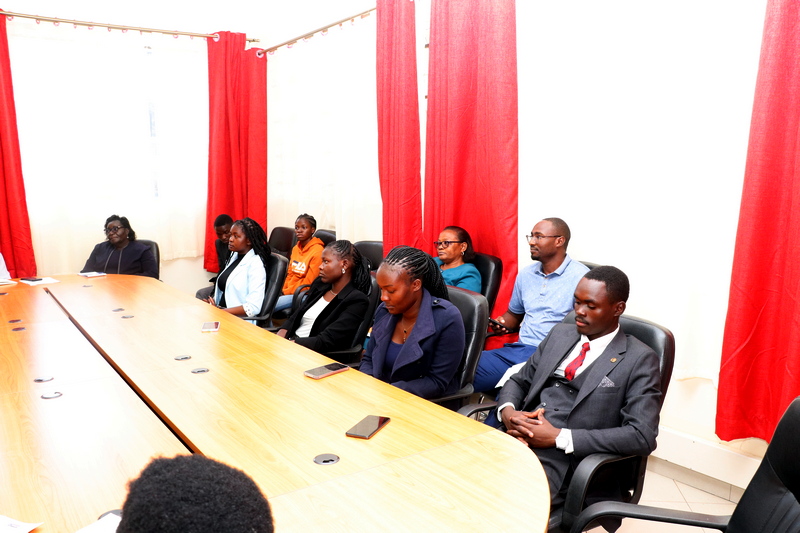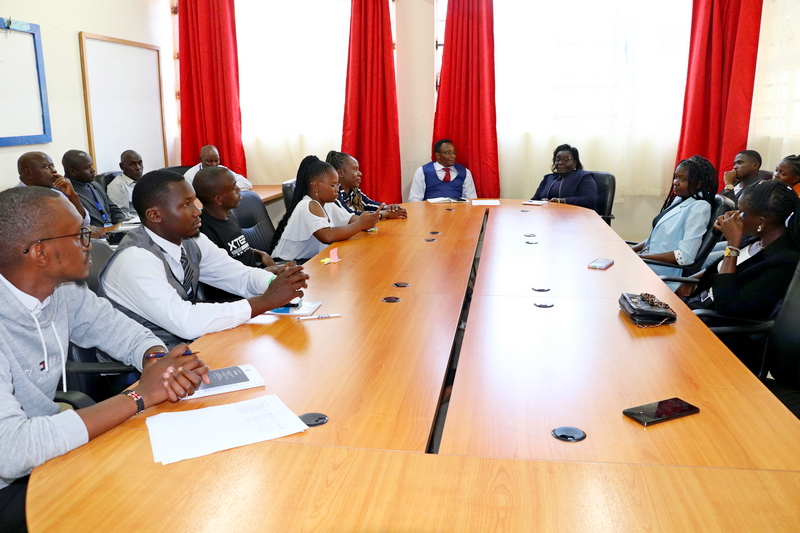Masinde Muliro University Benchmarks Student Welfare Services.
- Posted by admin
- Posted in Past Events
Machakos University Leads the Way: Masinde Muliro University Benchmarks Student Welfare Services.
Masinde Muliro University of Science and Technology (MMUST), Department of Student Affairs,recently identified Machakos University as an exemplary institution for benchmarking on student welfare given its renowned systems and innovative approaches to addressing student needs. The benchmarking exercise took place on 20th November 2024, focusing on a range of areas critical to student welfare and governance.
The MMUST team was led by Dr. Bernadette Abwao, the Dean of Students, accompanied by ten student leaders representing various facets of the student body. The team was warmly received at Machakos University by a multidisciplinary team comprising professionals and student representatives.
The Machakos University delegation included:
- Dr. Alex Kamwaria, Dean of Students, who provided overall coordination and insights into the university’s welfare systems.
- The Patron of the Travelling Theatre, who shared experiences on fostering creative expression and cultural identity among students.
- The Housekeeper, who detailed the operational strategies behind maintaining student accommodation facilities.
- The Cateress, who highlighted the university’s approach to delivering nutritious and affordable meals.
- The University Counsellor, who elaborated on mental health initiatives and the counselling framework.
- The Choir Patron, who emphasized the importance of nurturing talent and fostering unity through music.
- The Games and Sports Coordinator, who shared insights into the development of robust sports programs and competitive teams.
- A Representative from the Alumni Office, who discussed how the university leverages its alumni network for student empowerment and institutional growth.
- Members of the Student Governing Council, who shared their experiences in leadership and collaboration.
The MMUST delegation sought insights from Machakos University in the following key areas:
- Schemes to Support Needy Students: Mechanisms for identifying and assisting students with financial challenges.
- Income-Generating Activities by Student Organizations: Initiatives and projects spearheaded by student bodies to foster financial independence and sustainability.
- Student Council Projects: Development and execution of impactful projects by student leaders to benefit the university community.
- Special Interest Groups: Support systems and activities tailored to marginalized or minority groups within the student population.
- Catering, Health, and Accommodation Services: Provision of quality meals, healthcare, and housing to enhance students’ living and learning environments.
- Student Leaders’ Elections: Transparent and inclusive electoral processes for student leadership.
- Chaplaincy Services: Spiritual and pastoral care for students across diverse faiths.
- Co-Curricular Activities: Sports, cultural programs, and other extracurricular opportunities that enrich students’ university experience.
- Role of Alumni: Engagement of alumni in mentoring, funding, and career development for current students.
- Career Fairs: Platforms for students to connect with potential employers and explore career paths.
The visit provided a rich platform for knowledge sharing and mutual learning. Machakos University showcased its innovative programs, emphasizing sustainable and student-centered approaches. Particular highlights included the university’s comprehensive support schemes for needy students and the vibrant income-generating projects run by student organizations such as the tuck shops.
The MMUST delegation expressed profound appreciation for the valuable insights gained during the visit and commended Machakos University for its unwavering commitment to student welfare, pointing out that the lessons learned would play a pivotal role in shaping future strategies to enhance student welfare at their institution. The benchmarking exercise marks the beginning of future partnerships between the two institutions, aimed at enhancing student services and fostering the adoption of best practices.


